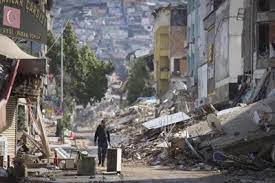Sinem Cengiz
It has now been more than 10 days since the devastating earthquakes struck the southeast of Turkiye and the north of Syria. Throughout this time, all Turks, whether in Turkiye or abroad, have psychologically collapsed. We have been and still are experiencing a mixture of feelings at the same time, such as desperation and hope, anger and happiness (the latter for those rescued). During these days, we have seen both the most beautiful and the ugliest aspects of humanity.
While writing this article, the official death toll has surpassed 35,000, making this disaster the deadliest in modern Turkish history, surpassing the 1939 Erzincan earthquake that killed 32,000 people. Turkiye is going through a process of a crisis within several other crises. This catastrophe wiped out the history, the past and the memories of so many people. It destroyed homes, ancient sites and even cities and a civilization. However, this calamity should not take the future of those who survived and who have suffered the pain of all the country. This collective pain should trigger a collective awareness.
There have been rays of light amid this darkness. The international community’s solidarity and response has been very important. It is certainly unforgettable to see countries from all across the world rushing to save lives. Some 74 countries sent rescue teams and aid to quake-hit Turkiye within a few hours. The list of countries to have provided support to the Turkish people is too long to mention here, but there are some noteworthy ones, such as Greece, Armenia and Israel. The Turkish people were always forced to believe that “Turks have no friends but the Turks.” However, this catastrophe has shown once again that countries can cast their hostilities aside and bind the wounds together. Because the pain unites. So, Turks do indeed have friends.
Greece, with whom Turkiye has troubled relations, was one of the first countries to send its rescue teams. Greek people sent aid with handwritten notes in Greek and Turkish saying: “May you get well soon, neighbor.” It is hard not to break down in tears when seeing one sharing your pain. It is also hard to forget the scene of a member of the Greek special disaster management team bursting into tears after pulling a seven-year-old girl out of the rubble in Iskenderun. Both Turkiye and Greece lie on seismic fault lines and they have a good record of standing by each other in times of natural disasters. After the earthquakes that took place first in Turkiye and then in Greece in 1999, the aid provided by the two countries to each other helped soften relations at that time.
Amid this darkness, a border crossing between Turkiye and Armenia opened for the first time in 35 years to allow humanitarian aid through. This was symbolically very important because the two countries still do not have formal relations, although there is an ongoing rapprochement process. The same border crossing was also used in 1988, when a big earthquake hit Armenia and the Turkish Red Crescent Society moved aid to the affected areas. Humanity has no borders, but unfortunately only disasters remind us of this reality.
Also, we cannot forget how Ukrainian rescue teams came to save lives in Turkiye while their country was at war. Although there were also Russian rescue teams on the ground, they only believed a single thing: “Just a life to save.” It was the same for both Palestinian and Israeli rescue teams, who worked for days amid the rubble. On one side, members of the Israeli rescue mission held Shabbat prayers, while on the other Palestinian rescue teams worked and prayed for the Turkish people.
In the midst of the disaster, when every second was important for a human life, all politics, tensions and interests were kept aside. Besides all the horrific memories of this calamity, these scenes will stay in my mind and heart, as well as the Turkish people’s minds and hearts, forever. It is noteworthy to say that the international support shown to Turkiye is more than just aid. It is actually a light at the end of the tunnel. It is a chance to bind the wounds created by years-long tensions. As Greek Foreign Minister Nikos Dendias said: “We do not need to wait for natural disasters to improve our relations.” Many call this earthquake diplomacy. Even if the tensions between neighbors — which also exhausts the people — might not change overnight, it should pave the way for a change of tone and approach. This is particularly important for Turkiye in the post-earthquake era. Turkiye will now go through several phases of rescue, rehabilitation and recovery. The Turkish people are exhausted by the political polarization at home and diplomatic tensions abroad. Rehabilitation is needed both at home and abroad.







